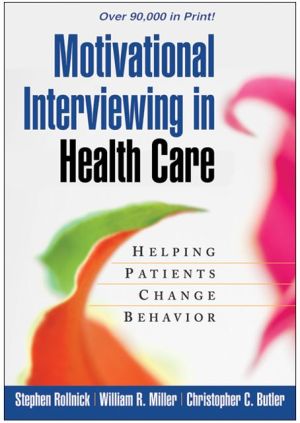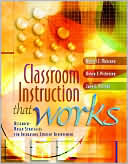Motivational Interviewing in Health Care: Helping Patients Change Behavior
Much of health care today involves helping patients manage conditions whose outcomes can be greatly influenced by lifestyle or behavior change. Written specifically for health care professionals, this concise book presents powerful tools to enhance communication with patients and guide them in making choices to improve their health, from weight loss, exercise, and smoking cessation, to medication adherence and safer sex practices. Engaging dialogues and vignettes bring to life the core skills...
Search in google:
Much of health care today involves helping patients manage conditions whose outcomes can be greatly influenced by lifestyle or behavior change. Written specifically for health care professionals, this concise book presents powerful tools to enhance communication with patients and guide them in making choices to improve their health, from weight loss, exercise, and smoking cessation, to medication adherence and safer sex practices. Engaging dialogues and vignettes bring to life the core skills of motivational interviewing (MI) and show how to incorporate this brief evidence-based approach into any health care setting. Appendices include MI training resources and publications on specific medical conditions. Bulletin of the Menninger Clinic "I highly recommend this book to directors of clinical services, analysts, therapists of all disciplines, and students. It has survived my usual skepticism for "new" approaches and has inspired me to seek training and supervision in MI."--Bulletin of the Menninger Clinic
Behavior Change and Motivational InterviewingMotivational Interviewing: Principles and Evidence 3How Motivational Interviewing Fits into Health Care Practice 11Core Skills of Motivational InterviewingPracticing Motivational Interviewing 33Asking 44Listening 65Informing 86Putting It All TogetherIntegrating the Skills 111Case Examples of a Guiding Style 121Getting Better at Guiding 140Beyond the Consultation 157Epilogue: Some Maps to Guide You 173Learning More about Motivational Interviewing 177A Topical Bibliography of Research on Motivational Interviewing 183Index 205
\ Reviewer: Gary B Kaniuk, Psy.D.(Cermak Health Services)\ Description: This book describes motivational interviewing, a concept developed in 1983 in order to help increase patient motivation and enhance behavioral change. Though initially used in dealing with alcoholism, motivational interviewing is now being used with other medical and psychological problems.\ Purpose: As stated in the preface, "the book is for any health care practitioner who spends time encouraging patients to consider behavior change." Later, in chapter one, the authors note, "This book was written to help you have productive conversations with patients about behavior change. In particular, we describe a gentle form of counseling known as motivational interviewing, which has been found effective in fostering change across a wide range of health behaviors." \ Audience: "The target audience is broad, including nurses, doctors, dieticians, psychologists, counselors, health educators, dentists, dental hygienists, social workers, physical and occupational therapists, podiatrists, and "sometimes even people who answer the office telephones," according to the authors. All of the authors have published extensively. Dr. Rollnick is professor of health care communications at Cardiff University, Dr. Miller is emeritus distinguished professor of psychology and psychiatry at the University of New Mexico, and Dr. Butler is professor of primary care medicine and head of the Department of Primary Care and Public Health at Cardiff University. "\ Features: The four guiding principles of motivational interviewing are: to resist the righting reflex; to understand and explore the patient's own motivations; to listen with empathy; and to empower the patient, encouraging hope and optimism. Motivational interviewing has been shown effective with substance abuse and other physical and psychological disorders such as cardiovascular disease, diabetes, diet, hypertension, psychosis, pathological gambling, and HIV infection. This book is a step-by-step approach to learning motivational interviewing and it begins with theory, presents the core skills, and then shows how to integrate these skills in a clinical setting. Chapter eight is wonderful in presenting three case studies on how to use the method. There are also clinical examples in other chapters as well. Other nice features are the epilogue, which provides more information on the process, appendix A, aids to learning, and appendix B, a topical bibliography. The bibliography is helpful because readers can turn right to the disorder they want more research/information on. The book is easy to read and practical and the tables and figures are instructional. This is the kind of book that you can read and use the information soon after in a clinical situation. However, appendix A does contain dozens of references for more training in motivational interviewing. \ Assessment: This is a practical, easy to read book that is useful with both psychiatric and physical disorders. It has a solid research base since its development in 1983. Though concise, it can help clients consider making important behavioral changes in their lives which can affect both their psychological and physical functioning. Healthcare providers will find it to be a welcome addition to their libraries, both in terms of having another set of techniques to assist clients and because of its low cost.\ \ \ \ \ Bulletin of the Menninger Clinic"I highly recommend this book to directors of clinical services, analysts, therapists of all disciplines, and students. It has survived my usual skepticism for "new" approaches and has inspired me to seek training and supervision in MI."--Bulletin of the Menninger Clinic\ \ \ \ Bulletin of the Menninger Clinic"I highly recommend this book to directors of clinical services, analysts, therapists of all disciplines, and students. It has survived my usual skepticism for new" approaches and has inspired me to seek training and supervision in MI."--Bulletin of the Menninger Clinic\ \ \ \ \ From the Publisher"We use this book for Coaching Wellness Behavior Change, a core class for all Exercise and Health Science students at UMass Boston. Lifestyle behavior has become a targeted issue contributing to population health. This book provides all health professionals (and future professionals) with invaluable information on developing provider-client relationships that facilitate change."--Dana Commesso, MA, Lecturer, College of Nursing and Health Sciences, University of Massachusetts, Boston\ \ "At the heart of rehabilitation are two central tenets: First, the patient is a key member of the rehabilitation team. Second, the rehabilitation process requires patients to learn and utilize new adaptive behaviors. How do we make these two key notions come alive in our interactions with patients? This text is the answer to that question. It provides useful theory, evidence-based methods, and clinical examples. The material is accessible and does not assume advanced knowledge of psychology. The message and skills in this book should be part of the practice of every rehabilitation professional."--Stephen T. Wegener, PhD, ABPP, Director, Division of Rehabilitation Psychology, Department of Physical Medicine and Rehabilitation, Johns Hopkins University "This book provides a well-organized, thoughtful discussion about how to develop a set of interpersonal skills that can promote the betterment of patient care and health behaviors. Pharmacy practice faculty would be well advised to incorporate these powerful methods and examples into courses that address health behaviors and/or patient counseling."--Douglas J. Pisano, PhD, Professor and Dean, School of Pharmacy, Massachusetts College of Pharmacy and Health Sciences "As pharmacists take an increasingly active role in health care and medication counseling, we now recognize that many 'medication problems' are, in essence, communication problems. Motivational interviewing allows pharmacists to communicate with their patients in a clear, concise, and structured way. Pharmacists and pharmacy students in any practice setting will benefit from implementing the tools and techniques in this book."--Ernest J Dole, PharmD, ABQ Health Partners, Albuquerque, New Mexico, and University of New Mexico College of Pharmacy \ "In this era of evidence-based practices in health care, practitioners still face the vexing question: Will my patient actually follow the procedures known to be efficacious? This book assists health care professionals in maximizing their effectiveness. An evidence-based practice in its own right, MI facilitates cooperation and compliance with treatment regimens. If you are a health care professional or a mental health professional consulting in a medical setting, and have ever wondered what to do with a seemingly 'unmotivated' patient, this is the book for you."--Barent Walsh, PhD, Executive Director, The Bridge of Central Massachusetts\ "This is an immensely useful text for teaching students and professionals how to help patients adopt health-promoting behaviors; for example, dieting, exercising, or attending follow-up appointments. Most such education concentrates on what to tell patients; this text concentrates on how to guide patients so that they will hear and implement the 'what.' As an MI trainer, I will be using this resource with a range of health care providers."--Robert G. Rhode, PhD, Department of Psychiatry, University of Arizona; member, Motivational Interviewing Network of Trainers (MINT)\ "This book delivers what it promises: practical, effective, and efficient strategies for producing more productive interactions with patients about behavior change. The authors, who are largely responsible for originating and refining MI, have translated this powerful evidence-based intervention into a set of core competencies and skills that can be easily understood, learned, practiced, and, most importantly, integrated into real-world clinical practice."--Michael G. Goldstein, MD, Associate Director for Clinical Education and Research, Institute for Healthcare Communication, and Department of Psychiatry and Human Behavior, Warren Alpert Medical School of Brown University\ "Many of today's leading causes of death are significantly related to modifiable health behaviors. This book provides a critical approach for helping patients change their behavior. Motivational interviewing (MI) provides a new alternative to the outdated direct persuasion approach, bringing a breath of fresh air to the conversation between health care providers and those with chronic diseases like diabetes and obesity. Practical examples and exercises make this book a powerful tool for use in educating medical students, nurses, and other health care professionals about encouraging patients to make healthy choices."--Robert Gabbay, MD, PhD, Executive Director, Penn State Hershey Diabetes and Obesity Institute\ "This practical guide moves motivational interviewing (MI) into the realm of everyday health care practice. Specifically, the book addresses the 'why' and the 'how-to' aspects of having conversations about behavior change. It helps clinicians learn to hear what their patients are really saying, and how to guide them through resolving ambivalence about behaviors. Relevant examples from various fields of medicine are provided. The chapter featuring extended examples of how to integrate MI into everyday interactions is particularly helpful. I see this as a useful resource for physicians, nurses, physician assistants, and other clinicians, as well as clinician educators involved in training students and residents."--Carol R. Schermer, MD, MPH, Department of Surgery, Division of Trauma, Loyola University Medical Center\ "Packed with practical pearls of wisdom for guiding patients in the process of changing many types of unhealthy behaviors, this easy-to-read book is a gift to all health care providers. The authors use real-life cases and believable dialogue to illustrate how to use listening skills to elicit the patient's perspective and build toward change. Too many of us in health care get discouraged and give up hope too soon when patients are not compliant with our advice, when we really should be trying a different way to approach the issues. This book's 'can-do' and 'no-blame' orientation helps the busy clinician regain satisfaction in relationships with patients and become more effective in facilitating change."--Edward Bernstein, MD, Department of Emergency Medicine, Boston University School of Medicine; Director, Brief Negotiated Interview and Appropriate Referral to Treatment (BNI-ART) Institute, Boston University School of Public Health\ "The authors highlight the underpinnings of effective communication and demonstrate how the spirit, philosophy, and principles of MI can actually enhance patient-provider relationships. This book is a 'must read' for health care practitioners across disciplines, from novice clinicians searching for practical advice to expert providers seeking professional refueling. Faculty will find this book invaluable for teaching future health care providers, as the information on MI is evidence based and the case examples are drawn from real-world clinical experiences. In today's fast-paced health care industry, providers may feel daunted by encroaching technology or hamstrung by requisite documentation. Therefore, enjoying meaningful interactions with patients becomes even more of a challenge. Fortunately, MI can help providers connect with their patients. After reading this book, one cannot help but feel empowered to change behavior."--Pam Burke, PhD, RN, Division of Adolescent Medicine, Boston Children's Hospital\ "I highly recommend this book for any practitioner dealing in health behavior change. In a conversational style with numerous helpful examples, the authors translate complex psychological concepts into easy-to-understand terms that will support and guide health care practitioners in improving their consultations with patients. The book is also a 'must' for undergraduates and graduate students who are interested in motivational interviewing within the world of health care practice."--Judith Carpenter, registered dietitian, Derbyshire County Primary Care Trust, UK\ \ \ \ \ \ Psychiatric Services"The authors are leading authorities in motivational interviewing, having founded, developed, and written extensively on the topic over the past 25 years....For a broad range of frontline clinicians, including those who work in various medical specialties, the book gives useful insights that can have an immediate impact by making one's practice more productive and more enjoyable. For those with special interest in human behavior, particularly those in the mental health field, this book is a concise, highly readable introduction to motivational interviewing and will likely pique interest for further study of this powerful tool for promoting change."--Psychiatric Services\ \ \ \ \ Drug and Alcohol Review"Provides practical guidance on how clinicians in health care settings can apply MI to promote change in a range of health-related behaviors, such as smoking, exercise, diet, use of new aids or medications, and uptake of services....The book reads like a practice guide, clearly aimed at the time-constrained clinician, with useful short summary statements stressing the main point of each section for the reader....Has the potential to make an important long-term impact on both the individual and population health outcomes."--Drug and Alcohol Review\ \ \ \ \ American Journal of Lifestyle Medicine"Rollnick, Miller, and Butler adroitly describe the spirit and practice of MI through richly annotated case examples and incisive metaphors to help the learner remember and understand key principles....The book provides an excellent description of state-of-the-art patient-centered communication for both newbies and established practitioners who are looking for a refresher in MI spirit."--American Journal of Lifestyle Medicine\ \ \ \ \ Child and Adolescent Mental Health Journal"This book represents the latest thinking from the principal architects and researchers of Motivational Interviewing (MI)....This book is an excellent introduction to MI and has been written to help clinicians integrate this guiding style into their practice. It is crammed with techniques and draws on a wide range of clinical material to illustrate how they can be used....Although not explicitly written for work with adolescents, there is a great deal of useful and relevant material. This is a highly readable book and an excellent resource both for novice and experienced MI practitioners."--Child and Adolescent Mental Health Journal\ \ \ \ \ South African Family Practice Journal"There are useful chapters on asking, listening, and informing skills that begin with general comments and then focus on specific skills and strategies for MI. The chapters are well illustrated with examples of dialogue from different settings....A number of case studies are given that relate ways in which health services is resonant with the respectful and collaborative nature of MI....The book has value for family physicians, general practitioners, and registrars who are interested in improving their communication skills, particularly in the area of brief behaviour change counselling. The simple yet powerful concepts regarding communication styles and skills will also be useful for teachers of communication skills."--South African Family Practice Journal\ \ \ \ \ Journal of Chronic Obstructive Pulmonary Disease"Motivational Interviewing (MI), a method of interacting with patients to enhance behavior change, is a well-tested and established method with over 160 randomized clinical trials demonstrating its efficacy across an array of medical conditions....This book is a helpful tool for all practitioners seeking a better commitment to behavior change in their patients. The skill set needed to accomplish the goal of behavior change is already developed in most clinicians. This book guides the reader through the process of honing those skills and switching effortlessly through the various methods of patient interaction to best achieve change."--Journal of Chronic Obstructive Pulmonary Disease\ \ \ \ \ Registered Nurse"Motivational Interviewing in Health Care offers a new approach in communicating for nurses—particularly providers treating patients with chronic diseases such as diabetes and obesity—and all health care professionals working to assist patients in making lifestyle changes for better health....As information technology relentlessly invades the realm of patient care, we find ourselves with less time to communicate with and teach our patients, so the time we do have must be optimized....In this book the reader is walked through and provided with positive steps to implement the MI guiding style of communication....Provides many examples of MI conversations, giving the reader insight into how MI communication works and is accomplished. I enjoyed the stories unfolding of how patients arrive at health change decisions, by themselves, if given the guided opportunity by an expert MI communicator. The book is a short, easy read which gave me food for thought and reinforced my continuing quest for a positive, therapeutic conversation with each of the patients. MI is also about caring for your own health."--Registered Nurse\ \ \ \ \ Choice"Practitioners such as nurses, the largest group of health care providers, will welcome the opportunity to add MI to their toolkit....Recommended."--Choice\ \ \ \ \ Nursing Standard"Will prove useful for practice nurses, health visitors, occupational therapists, physiotherapists, general practitioners, and mental health professionals....Excellent."--Nursing Standard\ \








